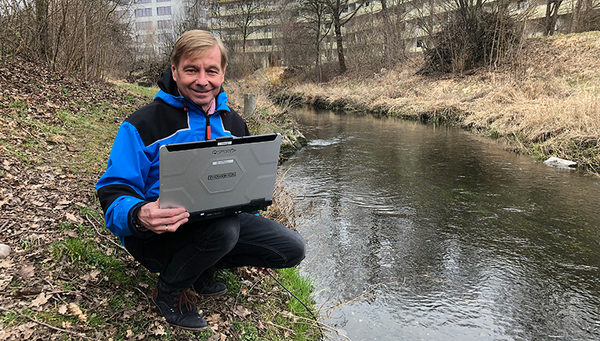News Detail
“This appointment shows that our work is gaining recognition abroad.”
March 8, 2023 |
In December 2022, Laval University in Quebec appointed Mario Schirmer as adjunct professor of hydrogeology. This professorship represents a recognition of Schirmer’s model- and field-related approaches to investigating groundwater flows and of his long-term commitment to build bridges between science and society. At Eawag, Schirmer has led the Hydrogeology research group since setting it up in 2008. His main research focus is on groundwater and its interactions with the soil and surface waters, e.g. as part of river revitalisation projects. Other focuses include urban hydrogeology and the role of groundwater under changing climatic conditions.
Schirmer held his first professorship at Germany’s Martin Luther University Halle-Wittenberg (MLU) from 2004 to 2008, after which he was appointed as adjunct professor at the University of Neuchâtel in 2008. He received the Dresden Groundwater Research Prize in 1999 for his doctoral thesis and was elected “Ineson Lecturer” for urban hydrogeology by the British Geological Society and the International Association of Hydrogeologists in 2019.
Four questions to Professor Mario Schirmer
Professor Schirmer, what does this appointment mean to you?
I’m particularly proud of it because it represents a recognition of my work and that of my group. The appointment also shows that our work is important and is gaining recognition abroad.
What motivates you when it comes to teaching?
For me, working with the students is vital. It’s not just about imparting the material – rather, it’s always a two-way street. I’ve often noticed that I delve into things a lot more deeply if I have to teach them. I never struggle to find the motivation to teach – I always look forward to lectures and seminars with the students.
What have been the key milestones in your career?
I completed my studies in geophysics at TU Bergakademie Freiberg in 1991, during the turbulent transition period following the collapse of the political system in the former East Germany, and I then went on to work on an EU project at the University of Stuttgart. My wife, Kristin, and I then decided to go to Canada as exchange students at the University of Waterloo to improve our English and broaden our horizons. This planned year abroad turned into six, and we both earned our doctorates there. In 1999, we both received an offer from what is now the Helmholtz Centre for Environmental Research GmbH – UFZ in Leipzig and moved back to Germany as a small family. I was made a head of department at the centre in 2002 and appointed as professor at the Martin Luther University Halle-Wittenberg (MLU) in 2004. When Kristin was offered a position as head of the Environmental Toxicology department in 2007, we decided to embark on another new start as a family and moved to Switzerland.
Apart from science, what other activities are you involved in?
The relationship between academia and society is very important to me. For example, I’m a delegate for my town, Wallisellen, to the regional water utility – where my expertise as a hydrogeologist comes in very useful. I’m also passionate about the Swiss Groundwater Network, which is currently in the process of being set up. A lot of work is going into this network, which we hope will improve networking in groundwater research in Switzerland and make this knowledge accessible to the wider public.
Cover picture: Professor Mario Schirmer at the Chriesbach in Dübendorf (Photo: Daniele La Cecilia, Eawag)

